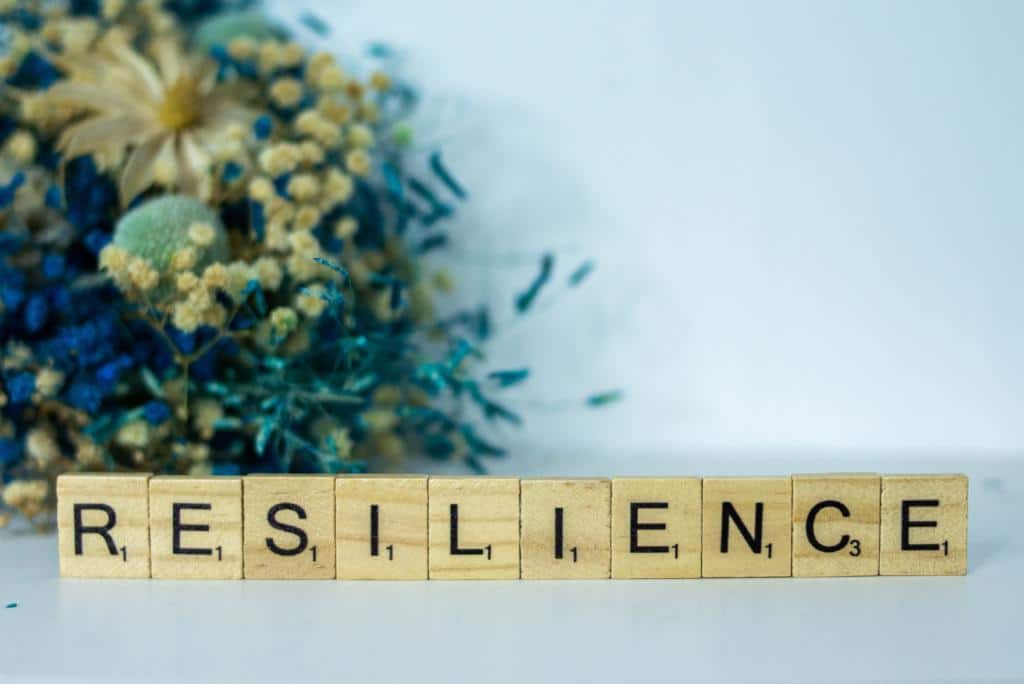5 Key Resilience Factors for Overcoming Challenges

Positive mental health is built on our ability to bounce back from tricky experiences that trigger psychological distress. In this article, we’ll share five protective factors that promote emotional resilience to help boost your natural resilience levels.
We’ll also reveal four personality traits to nurture, so you can face challenges and overcome obstacles more easily, cultivate a growth mindset, and enjoy greater life satisfaction.
Table of Contents
Strengthen Your Mental Health with Resilience
We all face personal challenges in our lives. It’s a part of being human, and not all stress comes from negative things like losing a loved one, having physical health challenges, or going through natural disasters. Even positive outcomes like getting a new job or promotion, getting married, or having a child can bring with them a high level of anxiety and stress, challenging our mental health and physical resilience.
Change, whether it’s good or bad, can feel scary. However, building resilience through learning positive coping skills helps us remain calm and become a more resilient person.
Having psychological resilience means that we can adapt well despite what can be significant adversity (Masten, 2001).1 Think about a well-rooted tree that can take the wind, rain, and snow through the harsh winter months and yet still bud into leaf each spring.
Positive Outcomes are Available to all of us
Resilience has been extensively studied in recent years, with a focus on understanding the key factors that contribute to someone’s level of resilience and what it means for our development and adjustment to situations (Luthar et al., 2000).2 You can learn more about this in our instant-book resilience webinar.
One of the key findings from resilience research is that it’s a common phenomenon that springs up from our normal human ability to adapt (Masten, 2001). Research suggests that children develop resilience as a part of their healthy development.
This means all of us can learn and build resilience, thank goodness! This is because our bodies and minds have evolved ways to protect us from the effects of stress, trauma, and other risk factors. These protective systems help us spring back from adversity and build resilience (Masten, 2001).

What are the Resilience Factors You Need to Nurture
There are several things that can help us when cultivating resilience3:
1. Social support: Having strong and positive relationships with family, friends, and other social networks is regularly linked with more resilience. It’s easy to overlook community factors, but having supportive people in our lives gives us both emotional and practical assistance during tough times. This strengthens our ability to cope and adapt.
2. Coping strategies: Effective coping strategies, such as problem-solving, seeking social support, and positive reframing, are all hugely important for resilience. When we’re able to effectively manage stress and adversity, we’re more likely to weather negative outcomes and risk factors and avoid long-term negative consequences.
3. Self-efficacy: Believing in one’s own abilities and having confidence in one’s capacity to overcome challenges has a positive relationship with recovering quickly from difficulties. Lacking a sense of perceived control can be stressful in itself! Self-efficacy helps us keep going in the face of stress and misfortune, so we still retain a positive outlook.
4. Positive emotions: The experience of emotions such as optimism, hope, and gratitude has been linked with a stronger ability to adapt to challenges. Positive emotions can help us reframe adversity, find meaning in our difficult experiences, and maintain an overall sense of well-being.
5. Adaptive cognitive processes: Emotionally resilient people often demonstrate adaptive cognitive processes, such as flexible thinking, problem-solving skills, and the ability to regulate emotions. These cognitive processes are an important factor in effectively navigating challenges and setbacks as they help us to see new solutions and perspectives.
Can You Improve Your Coping Skills?
Yes, you can. In a study which focused on doctors to discover which traits promote resilience,4 there are four in particular that demonstrate resilience:
- Self-directedness: People with this quality5 see how their way of thinking, their behaviours, and the challenges they go through are a reflection of the choices they make. They tend to accept responsibility for their mistakes, learn from them, and move on.
- Cooperativeness: We all want colleagues who seek to boost the results of our shared efforts.6 When we’re more tolerant and able to accept other people, we tend to feel less frustrated. This helps to lower a potential source of stress as we “get along” with those who have different perspectives or behaviours more easily.
- Harm avoidance: Life can feel tough, and occasionally avoiding things is normal. But if we’re constantly avoiding harm we’re more likely to be pessimistic, doubtful, worried, and tired.7 Those of us who are decisive and less anxious are more able to engage with uncertainty and risk. This helps us to feel more confident in making decisions.
- Persistence: The 30th President of the United States, Calvin Coolidge, once claimed that “Nothing in the world can take the place of persistence.”8 For many of us, being resilient is associated with the ability to “keep going”. Cultivating the stamina to persevere with a task involves overcoming frustration, developing new perspectives, setting realistic goals, and learning from our mistakes so we can course-correct.

That’s a Wrap
These qualities of resilience illustrate that there are key factors we can take into account and personal characteristics we can cultivate.
Now that you know the resilience factors you can focus on, how can you support resilience in your workplace?
Perhaps you want to assess the levels of psychological or emotional resilience in your organisation and encourage self-regulation skills or communication skills.
Perhaps you want to address low self-esteem in newly promoted managers, or reduce chronic stress across a department. Whatever you need, we offer tailored solutions to take your organisation to the next level.
Schedule a FREE consultation session with our founder James Pacey, check out the available workshop topics we offer for employees, instant-book wellbeing webinars, our resilience toolkit, or our manager training brochure.
And let’s cultivate more resilience – together.

Anya Pearse MAPP
Positive Psychology Writer
Get in touch
Other articles that may interest you…
10 Top Wellbeing at Work Ideas From Leading Organisations
Mental Health First Aid (MHFA): How Can It Enhance Wellbeing at Work?
How to Measure Employee Wellbeing: From Intuition to Actionable Insights
How to Build a Successful Employee Wellbeing Programme
- Masten, A. (2001). Ordinary magic: resilience processes in development.. American Psychologist, 56(3), 227-238. https://doi.org/10.1037/0003-066x.56.3.227
- Luthar, S., Cicchetti, D., & Becker, B. (2000). The construct of resilience: a critical evaluation and guidelines for future work. Child Development, 71(3), 543-562. https://doi.org/10.1111/1467-8624.00164
- Dev Psychopathol. 2000; 12(4): 857–885.
doi: 10.1017/s0954579400004156 - https://www.researchgate.net/publication/258956424_The_relationship_between_resilience_and_personality_traits_in_doctors_Implications_for_enhancing_well_being
- https://link.springer.com/referenceworkentry/10.1007/978-3-319-28099-8_1163-1#:~:text=People%20who%20are%20self%2Ddirected,as%20reliable%20and%20trustworthy%20persons
- https://link.springer.com/referenceworkentry/10.1007/978-3-319-28099-8_1163-1#:~:text=People%20who%20are%20self%2Ddirected,as%20reliable%20and%20trustworthy%20persons
- The Role of the Harm Avoidance Personality in Depression and Anxiety During the Medical Internship: https://www.ncbi.nlm.nih.gov/pmc/articles/PMC4602540/#:~:text=Harm%20avoidance%20(HA)%2C%20a,related%20to%20low%20serotonergic%20activity.
- The Positive Psychology of Persistence and Flexibility: http://www.drpaulwong.com/the-positive-psychology-of-persistence-and-flexibility/






